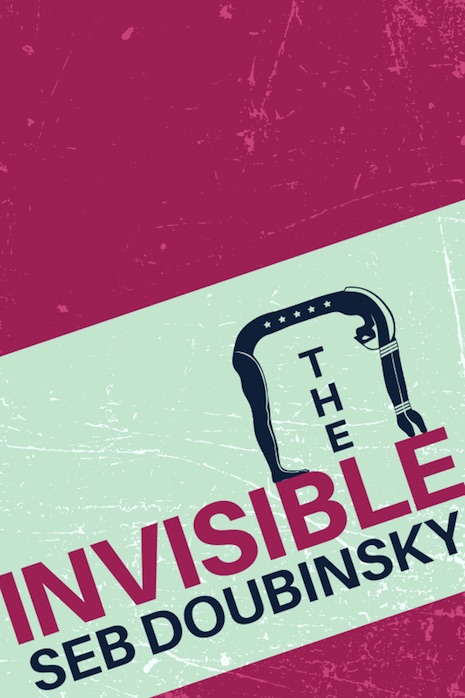
At the end of March, the writer Séb Doubinsky should have been traveling across America giving readings from his latest novel The Invisible. Picture him in a busy, crammed bookshop wearing a plaid shirt, leather jacket with steel-rimmed glasses and neatly-trimmed beard. He sits at a table with a pile of books to his left, a glass of water to his right, the audience in front. Some sit in chairs, some stand around the edges with arms folded, heads tilted, all listening to Doubinsky’s strong, clear voice. There are questions then a long-line of bright-eyed readers waiting to shake his hand, take pictures, and get their copies signed.
In another reality this all happened. Turn the page, there’s someone at the back, leaning against shelves laden with bright, clean paperbacks asking:
What is your earliest memory?
Sébastien Doubinsky: My earliest memory is actually a patchwork of scenes from my childhood in America, between 1966 and 1968. I can see myself playing with my favorite toys, which were rubber Mattel astronauts, watching black-and-white Spiderman cartoons sitting upside down on the sofa, riding in my father’s dark blue huge station-wagon, going to Space Needle’s fun park and having a blast… Very vivid memories, in color, which have certainly influenced the very way I write, like Pop Art—or rather Anti-Pop Art, as Rosenquist called it—and Punk well, much later.
But a virus stopped all this. Doubinsky is in lockdown at his home in Denmark. If anyone could have seen such a deadly pandemic coming then it was him. He had already written about a similar outbreak in Absinth—the story of the Apocalypse with ancient Gods attempting a new order, the publishing of a new gospel according to Jesus (“Burn all churches”), and an outbreak of Ebola that claims the lives of the President and the Vice-President. There’s hope for us yet! Doubinsky saw it coming.
What the Corona crisis taught us: all useful people are underpaid and all useless people are overpaid and decide who will live or die.
Peter Parker was bitten by a radioactive spider that gave him, in some unfathomable way, arachnid powers of strength and agility to jump great heights, climb walls, and have a tingling spider sense that alerted him to danger. At some point, most kids want to be Peter Parker, but then they give up on their imagination and subscribe to another’s imposed order.
August 1963, copies of The Amazing Spider-Man #3 were in bookshop carousels when Sébastien Doubinsky was born at a Parisian cinema. Spidey was fighting a new enemy the “grotesque Dr. Octopus.” Doubinsky’s parents had been watching a Hollywood western. They never saw the end of it. Celebrating the birth of a son was more important. Arriving at a hospital, Mother and child were doing fine. Father then found some work in America. Doubinsky spent his early years growing-up in the States watching TV and marveling at the unchanging blue sky. What’s your earliest memory? “I already answered that.”
Back in Paris, Doubinsky discovered a copy of William S. Burroughs’ The Ticket That Exploded while visiting his Aunt’s apartment on the Avenue René Coty. It was a weird looking book with a weird sounding title. Doubinsky sat down and read it. He was blown away. He might not have understood it but he knew he loved it. He had discovered his superpowers.
When did you first think seriously about becoming a writer and why?
SD: It’s rather a difficult question to answer, as there were many stages in this decision—at least until it became a rationally formulated one. I come from a very intellectual background, culturally mixed (Jewish and Catholic, but both my parents were leftists and radical atheists) and extremely open to other cultures. What’s more, both sides of my family had been very active in the French Résistance during World War Two, and I therefore inherited quite a strong human-rights ethic. All this to say that literature was not a passive element of my upbringing, but was seen as a powerful object that could serve the best or the worst causes, and that it was important.
Growing up I loved poetry, and for a long time wanted to be a poet (but also a painter, until I discovered I was colorblind…) but little by little, prose seeped in and took more and more space. I began to write some short stories in my late teenage years, but still not really considering dedicating myself seriously. The tragedy that sealed my writer’s fate was the suicide of my beloved cousin Bruno, then, like me, 20 years old. He had introduced me to punk and New Wave—especially The Cure, Bauhaus and all the darker stuff—and in his last note, he told me I should carry on writing “my great stuff.” That’s when the weight of words and the responsibility attached to writing hit me like a runaway train. That’s the day I really became, in my eyes, a “writer.”
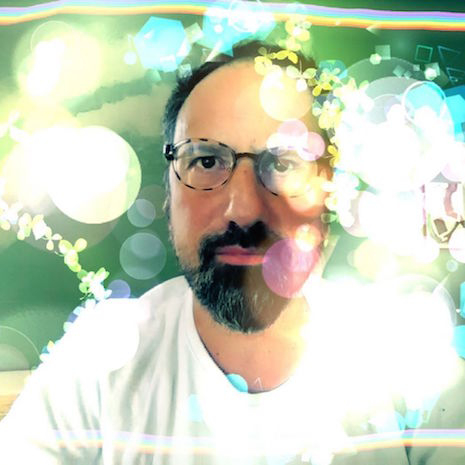
Sébastien Doubinsky.
Sébastien Doubinsky is the author of a dozen novels, several collections of essays and books of poetry. His novels revolve around a cycle of City-States stories. Characters and locations recur. Governments spy, enforce their will, drugs are taken, people die, few care. His work is a mix of dystopian science-fiction and literary noir. He is a poet who conjures speculative fiction in concise, crisp, clean sentences. His writing is deceptively simple but is worked at until every word serves a purpose. Imagine Kurt Vonnegut and Philip K Dick filtered through Burroughs and Brautigan, Ballard and Kerouac. Or put it this way: Sébastien Doubinsky is among the most important authors writing today, arguably in some realities the most important writer working today.
How do you write? What is your routine?
SD: I actually have no routine. I am a very, very undisciplined writer. That’s why I refrain from giving advice to other writers. Usually, I have a vague idea that I play with for a very long time—it can come from a painting, like The Babylonian Trilogy which was inspired by Robert Rauschenberg’s painting, “Traces”, a song (Absinth was written while listening to Bardo Pond’s “Destroying Angel” ), a memory, a free association of ideas, etc. Sometimes I write fragments down, and later collect them in one piece—or I don’t. My writing is very fragmentary, and so are my routines. I write in the holes.
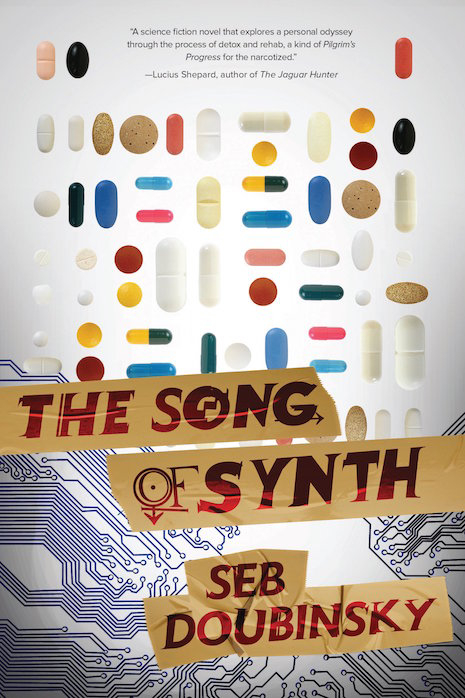
Let’s talk about your work, tell me about ‘Synth’ and why some people think it prophetic?
SD: Synth is a drug inspired by William Burrough’s remark that a junkie “is the drug.” I love Burroughs and I was always fascinated by that sentence, because it is meant in a negative way—which is perfectly understandable given WSB’s story of addiction. But for me, I could also see Synth as a freedom and political drug—something that puts you in control, instead of the other way around. And I wondered how governments would react—and they would flip, totally. They would wage a war on it as they did on LSD, and are still doing it on shrooms, MDMA and whatnot. The problem is not the lethal aspect of these drugs (which is close to zero compared to alcohol, heroin and anxiolitics), but they offer an escape route, which is intolerable for any system based on utter control of its citizens (even if they pretend the contrary). I think the “prophetic” aspect of Synth is that it is linked with the same type of society we live in today - this incredible mixture of Aldous Huxley’s Brave New World and George Orwell’s 1984 all wrapped into one. People have not much hope these days (unless you belong to the 1%, and I don’t mean the Hell’s Angels), so they need to escape. And dreaming is the most radical escape.
What do you dream about?
SD: My dreams are very incoherent too. I had a very stressful period for about ten years when I didn’t dream at all. Very strange and oppressing. Then suddenly, the dreaming came back. Always in color. Sometimes I dream about scenes of my novels, either written or about to be written. I have discussions. I travel. I often find myself on a large ship (like last night), which is a mixture of a yacht and a ferry. I talked with Agwé, the Vaudou god of the Sea. We often speak together. Nothing mysterious there, just friendly conversations. Awake, I am a staunch rationalist. At night, I speak with the gods. I have a very split personality. I think it shows in my writing too.
Do you think (as Burroughs did) that writers can sometimes predict things through their writing?
SD: Yes, definitely. At least, for those who take writing seriously and as a type of fight. I agree with Burroughs and André Breton (who said it first) on this. That’s why they end up in prison, or are ignored by mainstream media until they die, then are turned into useless icons for the mainstream audience.
Are you optimistic about the future?
SD: Well, I’ll tell you a Jewish joke that my late father used to tell me:
Q: What is the difference between an optimist and a pessimist?
A: Well, a pessimist is someone who says: “It’s all going to shit! It can get worse than this!” And an optimist is someone who replies: “Oh yes, it can! Yes, it can!”
So, I’m an optimist, I guess.
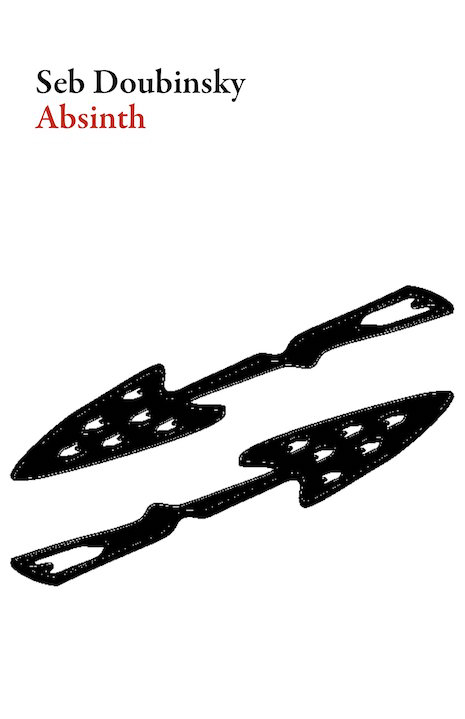
We’re going through strange times like the apocalypse you wrote about in ‘Absinth.’ A virus is changing our world, changing our view of what is important. Is politics important? Or, will coronavirus change everyone to stop being tribal in their differences and become more humanist?
SD: Politics is essential. I am a poltical writer and I consider all forms of expression as political, whether you are aware of it or not. I have written a short essay called “Reading, Writing, Rebelling” that you can find for free online. The coronavirus is interesting because it is exposing the true face of all our control-freak governing instances, which is their utter impotence, and how deeply they have destroyed the social fabric of our societies.
To understand how government works, you have to see how political parties work. None of them have a true democratic structure. It is therefore rigged from the start. And yes, we should distrust power. We have to. That’s why Thatcher and Blair, the the EU itself destroyed the Unions—they were too dangerous to have around, uncontrolled. The future of humanism will come through a new way of organizing ourselves, like it happened in the XIXth century, between 1848 and 1890. New unions based on human dignity and not political calculation will be unstoppable.
In this aspect, it is quite the anarchist virus. Let’s hope people will remember that everything was made worse because of the destruction of the public heath systems (among many other things).
You writing is clear, concise, effective, deceptively simple, but I know you spend time, a lotta time working on a sentence, a paragraph, a chapter. How did you develop your writing style?
SD: It’s a very difficult question, because I don’t really see or recognize my style. It is my voice, I have no distance. What I can tell you is what influenced me: Richard Brautigan, William Burroughs and Paul Bowles for their conciseness and precision; Kerouac for his deep melancholy and humanity; Huxley, Orwell, and Zamyatin for their poltical eye; Ann Quin, Virginia Woolf and Monique Wittig for their incredible imagination and feminist stance; Chester Himes and Eldrige Cleaver because “Black is tough and beautiful;” the Pop Art artists for their violence and irony (Rauschenberg, Rosenquist, Warhol, Wesselman); punk and post-punk because I was there and still am.
And now an unfair question, apart from your latest ‘The Invisible,’ what is your favourite book? One that you have written—and why?
SD: Well, like a father or a mother, I have no favorite child. But at this very moment, I do look with a certain affection at Absinth, as it narrates the Apocalypse f***ing up.
‘The Invisible’ will be published by the Meerkat Press in August this year. Meantime, check out Doubinsky’s other books like ‘Missing Signal’ or ‘The Song of Synth,’ ‘Absinth,’ ‘White City,’ or ‘Mega Gray.’ Follow Seb on Twitter and read his blog here.
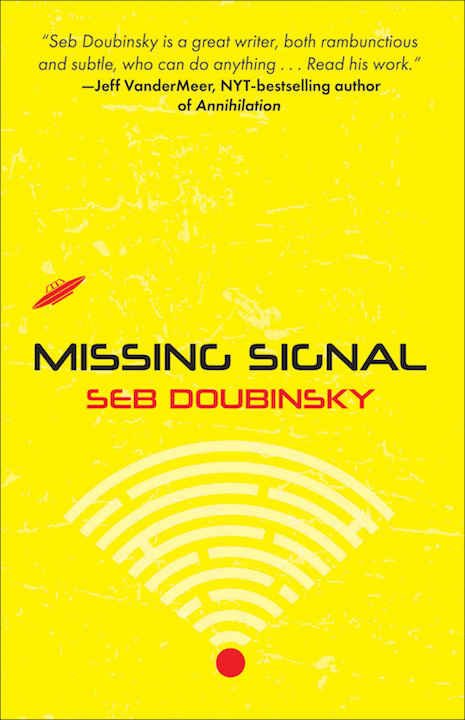
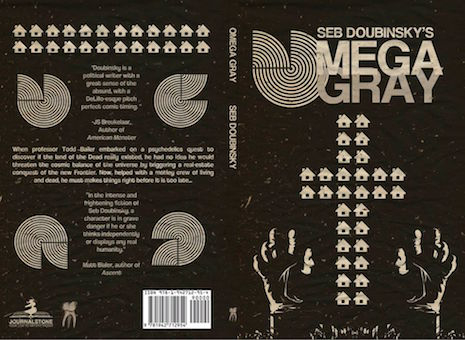
Previously on Dangerous Minds:
‘Say Goodbye to Love’: Sig Waller’s seriously dark & twisted art
‘An ABZ of Love’: Kurt Vonnegut’s vintage go-to guide on sex and sexuality
That time Jack Kerouac asked Marlon Brando to make a movie of ‘On the Road’ 1957
That time Jack Kerouac finked out on helping Allen Ginsberg promote ‘Junkie’
Richard Brautigan reading from ‘Trout Fishing in America’ and ‘In Watermelon Sugar’
When William S. Burroughs met Francis Bacon: Uncut
William Burroughs: Scans of his porn mag articles
RE/Search’s Vale and JG Ballard on William Burroughs